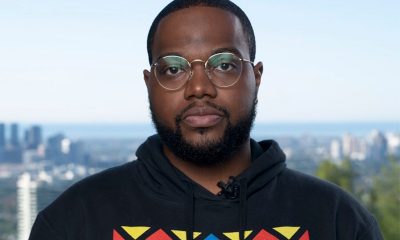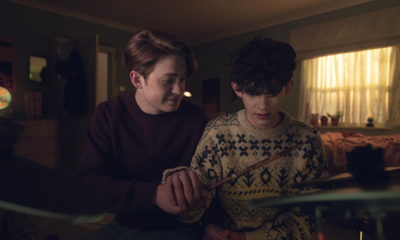Movies
LGBT content strong in summer ’18 movie spate
‘Star Wars,’ ‘Mamma Mia’ sequel, Whitney Houston doc among highlights
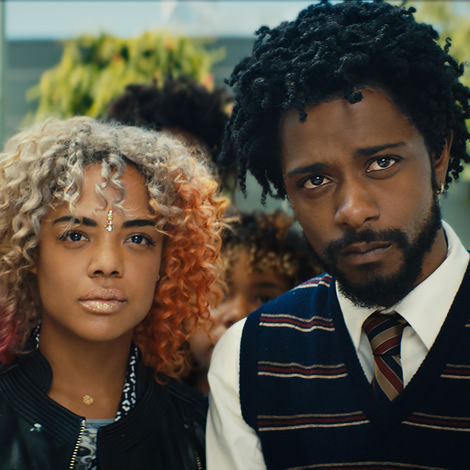
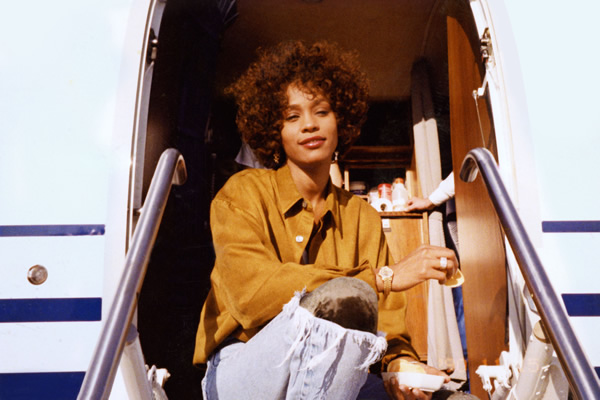
A scene from the documentary ‘Whitney.’ (Photo courtesy Roadside Attractions)
This weekend, the 2018 summer movie season blasts off with the release of “Solo: A Star Wars Story,” an excellent addition to the franchise. Hollywood veteran Ron Howard directs with great visual and narrative clarity and the fast-paced script by “Star Wars” veteran Lawrence Kasdan and his son Jon effortlessly combines action, humor, drama and suspense.
The LGBT summer movie season kicks off on June 1 with queer auteur John Cameron Mitchell’s delightful new movie “How to Talk to Girls at Parties.” Destined to be a cult classic, the movie stars Nicole Kidman as Queen Boadicea, a punk priestess who finds herself caught in a battle between humans and aliens. the fun film also stars Elle Fanning and newcomer Alex Sharp as the literally star-crossed lovers.
The June LGBT movie calendar is crammed with other exciting new queer films. Premiering on Netflix on June 8, “Alex Strangelove” is about a high school teen’s journey of sexual exploration. Slated for a June 15 opening in D.C., “A Kid Like Jake” stars Jim Parsons and Claire Danes as the parents of a 4-year old gender-nonconforming child. Opening on June 22, “Hearts Beat Loud” stars Nick Offerman as a divorced father who forms a songwriting team with his lesbian daughter.
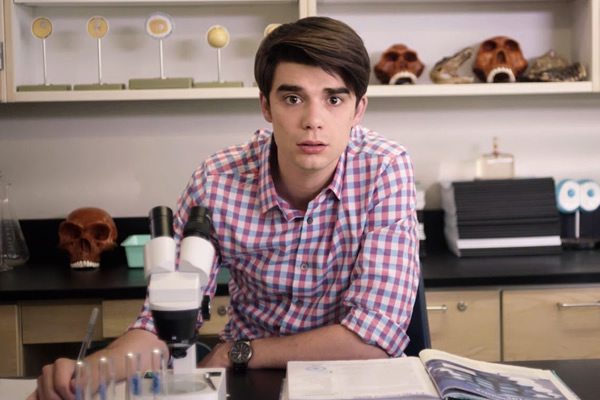
DANIEL DOHENY as Alex in ‘Alex Strangelove.’ (Photo courtesy Netflix)
“Nancy” (June 29) is the story of an unbalanced young women who assumes different personalities as she surfs the Internet. The movie is written and directed by Christina Choe (winner of the Waldo Salt Screenwriting Award at Sundance) and stars Andrea Riseborough (“The Battle of the Sexes” and “The Death of Stalin”). The rest of the stellar cast includes Ann Dowd, Steve Buscemi, J. Smith-Cameron and John Leguizamo.
Pride month releases also include “The Misandrists” (June 15). Directed by legendary gay provocateur Bruce La Bruce, the film begins when a young man fleeing the police unintentionally seeks refuge at a lesbian separatist stronghold.
Among LGBT fan favorites, the long-awaited sequel to Pixar’s “The Incredibles” (2004) arrives on June 15. “Incredibles 2” brings back the original cast of superheroes trying to blend in. Director Brad Bird once again threatens to steal the movie with his cameo as Edna Mode (“No capes!”), a sly tribute to iconic Hollywood costume designer and barely closeted lesbian Edith Head.
Another old gang is reunited on July 20 in “Mamma Mia! Here We Go Again,” the effervescent sequel to the original ABBA fest. Flashbacks reveal how Donna Sheridan (Meryl Streep in the present; Lily James in the past) met her three suitors. Cher joins the cast as Donna’s mother. There’s no word yet on whether or not Pierce Brosnan will try to sing again or if Colin Firth’s Greek boyfriend will return.
On the mainstream front, some of the other big releases include the all-female “Ocean’s 8” (June 8); “Hereditary,” a horror story starring Toni Collette (June 8); “Jurassic World: Fallen Kingdom” (June 22), starring Chris Pratt, Bryce Dallas Howard and her impressive heels; “Ant-Man and the Wasp” (July 6); “Sorry to Bother You,” a satirical critique of capitalism and racism starring Lakeith Stanfield and Tessa Thompson (July 6); Timothée Chalamet’s “Hot Summer Nights” (July 27); and “Crazy Rich Asians” (Aug. 17).
On the lighter side, there’s Mila Kunis and out actor Kate McKinnon in “The Spy Who Dumped Me” (Aug. 3) and “The Happytime Murders” starring Melissa McCarthy and a bunch of puppets (Aug. 17).
Award season gets an early start on Aug. 10 with Spike Lee’s latest film “BlacKkKlansman,” a favorite at Cannes. Based on a true story, Lee’s latest opus is about an African-American police officer who infiltrates the KKK in the 1970s.
On the local front, summer screenings by Reel Affirmations will include “Ideal Home” starring Paul Rudd and Steve Coogan as a bickering gay couple who suddenly acquire a 10-year old grandson (June 22).
Two outstanding D.C. film festivals also have some fun programs scheduled. D.C. Shorts will be presenting “DC Shorts Laughs” June 22-23. This innovative event pairs local comedians with outstanding short comedy films. This year’s film slate includes “Ruby Full of Shit” about the holiday showdown between the new boyfriend and a bratty 6-year old.
The international “48 Hour Film Fest” challenges teams of local filmmakers to create a short film in just two days. The winner of the D.C. competition will be revealed at the “Best Of” screening on June 22.
Under the direction of Michael Lumpkin, the out Director of AFI Festivals, “AFI DOCS” will return from June 13-17. The international celebration of documentary films again includes strong LGBT content, including the world premiere “Alone in the Game,” about the challenges faced by out LGBT athletes; “Dark Money” directed by transgender filmmaker Kimberly Reed; “Don’t Be Nice” about a diverse group of slam poets; “Transmilitary” about four servicemembers who come out to top officials at the Pentagon; and “United We Fan,” about dedicated fans who lobby for the return of cancelled series and one lesbian fan who protests “Lesbian Death Trope.”
AFI DOCS also includes documentaries about comedian Gilda Radner, designer Steve McQueen and the fabulous Studio 54.
Some of the other great documentaries premiering this summer include “Whitney” (July 6); “Love, Cecil,” a look back at the dazzling career of Hollywood costume designer Cecil Beaton; “Scotty and the Secret History of Hollywood” about the infamous pimp Scotty Bowers (July 27) and “The Gospel According to André,” (June 1) an insightful look at André Leon Talley, the trailblazing black gay fashion editor who grew up in the Jim Crow South.
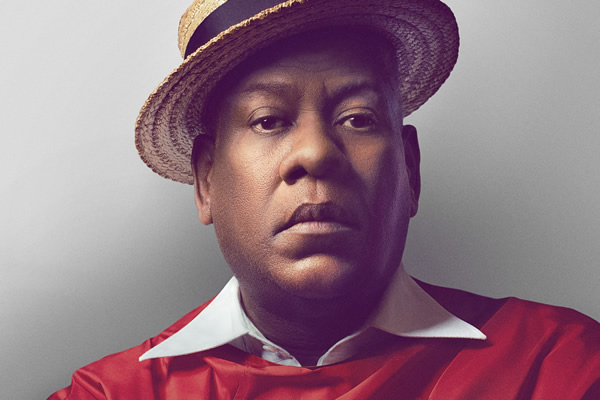
Fashion guru ANDRE LEON TALLEY in ‘The Gospel According to Andre.’ (Photo courtesy Magnolia Pictures)
As usual, AFI Silver in downtown Silver Spring brings some serious sizzle to the summer schedule. Some of the highlights includes Spanish Cinema Now (May 31-June 3) which includes “Anchor and Hope” about a lesbian couple who enlist the help of a good friend to help them conceive; the D.C. Caribbean FilmFest (June 8-13) which includes the Grace Jones biopic “Bloodlight and Bami;” and, “Sorry to Bother You” which is part of the Color of Conversation, a new partnership between AFI and the Martha’s Vineyard African American Film Festival.
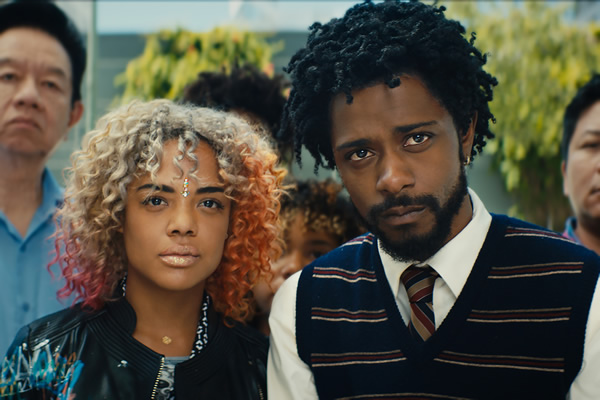
TESSA THOMPSON and LAKEITH STANFIELD in ‘Sorry to Bother You.’ (Photo courtesy Annapurna Pictures)
From July 5-12, AFI will present the new 70mm print of “2001: A Space Odyssey” to kick off its Stanley Kubrick retrospective.
The Maryland Film Festival has an active summer schedule at the Parkway Theatre in Baltimore. On June 2, MdFF will screen “Wild Nights with Emily,” an unconventional biopic of poet Emily Dickinson starring Molly Shannon, as a fundraiser for Baltimore Pride. Other LGBT highlights include “Howard”, a documentary about openly gay legendary lyricist Howard Ashman (“Little Shop of Horrors” and “Beauty and the Beast”) on June 23 and Sundance favorite “The Miseducation of Cameron Post” on Aug. 17.
Following on the heels of the successful annual festival which included the “Rated LGBTQ” series, the Washington Jewish Film Festival will screen three audience favorites this summer, including “The Invisibles.”
Finally, on June 18, there is an important documentary that every family should enjoy together. Directed by Morgan Neville (“20 Feet from Stardom” and “Best of Enemies”), “Won’t You Be My Neighbor” is a moving and charming tribute to the legendary Fred Rogers and his enduring and endearing legacy.
Movies
As Oscars approach, it’s time to embrace ‘KPop Demon Hunters’
If you’ve resisted it, now’s the time to give in

If you’re one of the 500 million people who made “KPop Demon Hunters” into the most-watched original Netflix title in the streaming platform’s history, this article isn’t for you.
If, however, you’re one of the millions who skipped the party when the Maggie Kang-created animated musical fantasy debuted last summer, you might be wondering why this particular piece of pop youth culture is riding high in an awards season that seems all but certain to end with it winning an Oscar or two; and if that’s the case, by all means, keep reading.
We get it. If you’re not a young teen (or you don’t have one), it might have escaped your radar. If you don’t like KPop, or the fantasy genre just isn’t your thing, there would be no reason for that title to pique your interest – on the contrary, you would assume it’s just a movie that wasn’t made for you and leave it at that.
It’s now more than half a year later, though, and “KPop Demon Hunters” has yet to fade into pop culture memory, in spite of the “new, now, next” pace with which our social media world keeps scrolling by. It might feel like there’s been a resurgence of interest since the film’s ongoing sweep of major awards in the Best Animated Film and Best Song categories has led it close to Oscar gold, but in reality, the interest never really flagged. Millions of fans were still streaming the soundtrack album on a loop, all along.
It wasn’t just the music that they embraced, though that was definitely a big factor – after all, the film’s signature song, “Golden,” has now landed a Grammy to display alongside all of its film industry accolades. But Kang’s anime-influenced urban fantasy taps into something more substantial than the catchiness of its songs; through the filter of her experience as a South Korean immigrant growing up in Canada, she draws on the traditions and mythology of her native culture while blending them seamlessly into an infectiously contemporary and decidedly Western-flavored “girl power” adventure about an internationally popular KPop girl band – Huntrix, made up of lead singer Rumi (Arden Cho), lead dancer Mira (May Hong), and rapper/lyricist Zoey (Ji-young Yoo) – who also happen to be warriors, charged with protecting humankind from the influence of Gwi-Ma (Lee Byung-hun), king of the demon world, which is kept from infiltrating our own by the power of their music and their voices. Oh, and also by their ability to kick demon ass.
In an effort to defeat the girls at their own game, Gwi-Ma sends a demonic boy band led by handsome human-turned-demon Jinu (Ahn Hyo-seop) to steal their fans, creating a rivalry that (naturally) becomes complicated by the spark that ignites between Rumi and Jinu, and that forces Rumi to confront the half-demon heritage she has managed to keep secret – even from her bandmates – but now threatens to destroy Huntrix from within, just when their powers are needed most.
It’s a bubble-gum flavored fever-dream of an experience, for the most part, which never takes itself too seriously. Loaded with outrageous kid-friendly humor and pop culture parody, it might almost feel as if it were making fun of itself if not for the obvious sincerity it brings to its celebration of all things K-Pop, and the tangible weight it brings along for the ride through its central conflict – which is ultimately not between the human and demon worlds but between the long-held prejudices of the past and the promise of a future without them.
That’s the hook that has given “KPop Demon Hunters” such a wide-ranging and diverse collection of fans, and that makes it feel like a well-timed message to the real world of the here and now. In her struggle to come to terms with her part-demon nature – or rather, the shame and stigma she feels because of it – Rumi becomes a point of connection for any viewer who has known what it’s like to hide their full selves or risk judgment (or worse) from a world that has been taught to hate them for their differences, and maybe what it’s like to be taught to hate themselves for their differences, too.
For obvious reasons, that focus adds a strong layer of personal relevance for queer audiences; indeed, Kane has said she wanted the film to mirror a “coming out” story, drawing on parallels not just with the LGBTQ community, but with people marginalized through race, gender, trauma, neurodivergence – anything that can lead people to feel like an “other” through cultural prejudices and force them to deal with the pressure of hiding an essential part of their identity in order to blend in with the “normal” community. It plays like a direct message to all who have felt “demonized” for something that’s part of their nature, something over which they have no choice and no control, and it positions that deeply personal struggle as the key to saving the world.
Of course, “KPop Demon Hunters” doesn’t lean so hard into its pro-diversity messaging that it skimps on the action, fun, and fantasy that is always going to be the real reason for experiencing a genre film where action, fun, and fantasy are the whole point in the first place. You don’t have to feel like an “other” to enjoy the ride, or even to get the message – indeed, while it’s nice to feel “seen,” it’s arguably much more satisfying to know that the rest of the world might be learning how to “see” you, too. By the time it reaches its fittingly epic finale, Kane’s movie (which she co-directed with Chris Appelhans, and co-wrote with Appelhans, Danya Jimenez, and Hannah McMechan) has firmly made its point that, in a community threatened by hatred over perceived differences, the real enemy is our hate – NOT our differences.
Sure, there are plenty of other reasons to enjoy it. Visually, it’s an imaginative treat, building an immersive world that overlays an ancient mythic cosmology onto a recognizably contemporary setting to create a kind of whimsical “metaverse” that feels almost more real than reality (the hallmark of great mythmaking, really); yet it still allows for “Looney Toons” style cartoon slapstick, intricately choreographed dance and battle sequences that defy the laws of physics, slick satirical commentary on the juggernaut of pop music and the publicity machine that drives it, not to mention plenty of glittery K-Pop earworms that will take you back to the thrill of being a hormonal 13-year-old on a sugar high; but what makes it stand out above so many similar generic offerings is its unapologetic celebration of the idea that our strength is in our differences, and its open invitation to shed the shame and bring your differences into the light.
So, yes, you might think “KPop Demon Hunters” would be a movie that’s exactly what it sounds like it will be – and you’d be right – but it’s also much, much more. If you’ve resisted it, now’s the time to give in.
At the very least, it will give you something else to root for on Oscar night.
Movies
50 years later, it’s still worth a return trip to ‘Grey Gardens’
Documentary remains entertaining despite its darkness
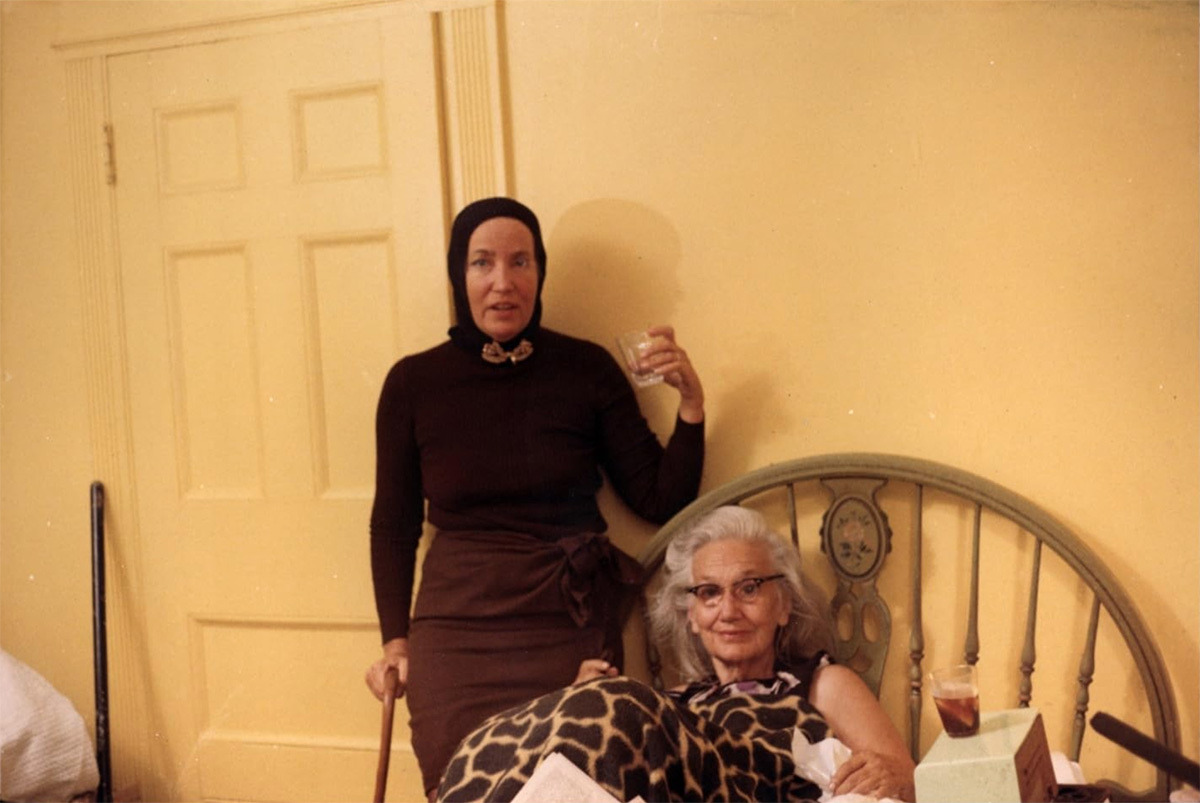
If we were forced to declare why “Grey Gardens” became a cult classic among gay men, it would be all the juicy quotes that have become part of the queer lexicon.
Celebrating the 50th anniversary of its theatrical release this month, the landmark documentary profiles two eccentrics: Edith Ewing Bouvier Beale and her daughter, Edith Bouvier Beale (known as “Big” and “Little” Edie, respectively), the aunt and cousin of former first lady Jaqueline Kennedy Onassis and socialite Lee Radziwell. Once moving within an elite circle of American aristocrats, they had fallen into poverty and were living in isolation at their run-down estate (the Grey Gardens of the title) in East Hampton, Long Island; they re-entered the public eye in 1972 after local authorities threatened eviction and demolition of their mansion over health code violations, prompting their famous relatives to swoop in and pay for the necessary repairs to avoid further family scandal.
At the time, Radziwell had enlisted filmmaking brothers David and Albert Maysles to take footage for a later-abandoned project of her own, bringing them along when she went to put in an appearance at the Grey Gardens clean-up efforts. It was their first encounter with the Beales; the second came two years later, when they returned with their cameras (but without Radziwell) and proceeded to make documentary history, turning the two Edies into unlikely cultural icons in the process.
On paper, it reads like something painful: two embittered former socialites, a mother and daughter living among a legion of cats and raccoons in the literal ruins of their former life, where they dwell on old memories, rehash old conflicts, and take out their resentments on each other, attempting to keep up appearances while surviving on a diet that may or may not include cat food. Truthfully, it is sometimes difficult to watch, which is why it’s easier to approach from surface level, focusing on the “wacky” eccentricities and seeing the Beales as objects for ridicule.
Yet to do so is to miss the true brilliance of a movie that is irresistible, unforgettable, and fascinating to the point of being hypnotic, and that’s because of the Beales themselves, who are far too richly human to be dismissed on the basis of conventional judgments.
First is Little Edie, in her endless array of headscarves (to cover her hair loss from alopecia) and her ever-changing wardrobe of DIY “revolutionary costumes,” a one-time model and might-have-been showgirl who is obviously thrilled at having an audience and rises giddily to the occasion like a pro. Flamboyant, candid, and smarter than we think, she’s also fearlessly vulnerable; she gives us access to an emotional landscape shaped by the heartbreaks of a past that’s gradually revealed as the movie goes on, and it’s her ability to pull herself together and come back fighting that wins us over. By the time she launches into her monologue about being a “S-T-A-U-N-C-H” woman, we have no doubt that it’s true.
Then there’s Big Edie, who comes across as an odd mix of imperious dowager and down-to-earth grandma. She gets her own chance to shine for the camera, especially in the scenes where she reminisces about her early days as a “successful” amateur vocalist, singing along to records of songs she used to perform as glimpses emerge of the beauty and talent she commanded in her prime. She’s more than capable of taking on her daughter in their endless squabbles, and savvy enough to score serious points in the conflict, like stirring up jealousy with her attentions to beefy young handyman Jerry – whom the younger Edie has dubbed “the Marble Faun” – when he comes around to share a feast of boiled corn-on-the-cob with them. “Jerry likes the way I do my corn,” she deadpans to the camera, even though we know it’s meant for Little Edie.
It’s not just that their eccentricities verge on camp; that’s certainly an undeniable part of the appeal, but it falls away quickly as you begin to recognize that even if these women are putting on a show for the camera, they’re still being completely themselves – and they are spectacular.
Yes, their verbal sparring is often shrill and palpably toxic – in particular, Big Edie has no qualms about belittling and shaming her daughter in an obviously calculated effort to undermine her self-esteem and discourage her from making good on her repeated threats to leave Grey Gardens. We know she is acting from fear of abandonment, but it’s cruel, all the same.
These are the moments that disturb us more than any of the dereliction we see in their physical existence; fed by nostalgia and forged in a deep codependence that neither wants to acknowledge, their dynamic reflects years of social isolation that has made them into living ghosts, going through the habitual motions of a long-lost life, ruminating on ancient resentments, and mulling endlessly over memories of the things that led them to their outcast state. As Little Edie says early on, “It’s very difficult to keep the line between the past and the present. Do you know what I mean?”
That pithy observation, spoken conspiratorially to the Maysles’ camera, sets the tone for the entirety of “Grey Gardens,” perhaps even suggesting an appropriate point of meditation through which to contemplate everything that follows. It’s a prime example of the quotability that has helped this odd little movie endure as a fixture in queer culture; for many LGBTQ people, both Edies – born headstrong, ambitious, and independent into a social strata that only wanted its women to be well-behaved – became touchstones of frustrated longing, of living out one’s own fabulousness in isolated secrecy. Add to that shared inner experience Little Edie’s knack for turning scraps into kitschy fashion (and the goofy-but-joyous flag dance she performs as a sort of climactic topper near the end), and it should be obvious why the Maysles Brothers’ little project still resonates with the community five decades later.
Indeed, watching it in today’s cultural climate, it strikes chords that resonate through an even wider spectrum, touching on feminist themes through these two “problematic” women who have been effectively banished for refusing to fit into a mold, and on the larger issue of social and economic inequality that keeps them trapped, ultimately turning them against each other in their powerlessness.
With that in mind, it’s clear these women were never filmed to be objects of ridicule. They’re survivors in a world in which even their unimaginably wealthy relatives would rather look away, offering a bare minimum of help only when their plight becomes a matter of public family embarrassment, and the resilience they show in the face of tremendous adversity makes them worthy of celebration, instead.
That’s why “Grey Gardens” still hits close to home, why it entertains despite its darkness, and why we remember it as something bittersweet but beautiful. By the end of it, we recognize that the two Edies could be any of us, which means they are ALL of us – and if they can face their challenges with that much “revolutionary” spirit, then maybe we can be “staunch” against our adversities, too.
Movies
‘Pillion’ director on bikers, BDSM, and importance of being seen
‘We put a lot of thought and effort into how we depicted the community’
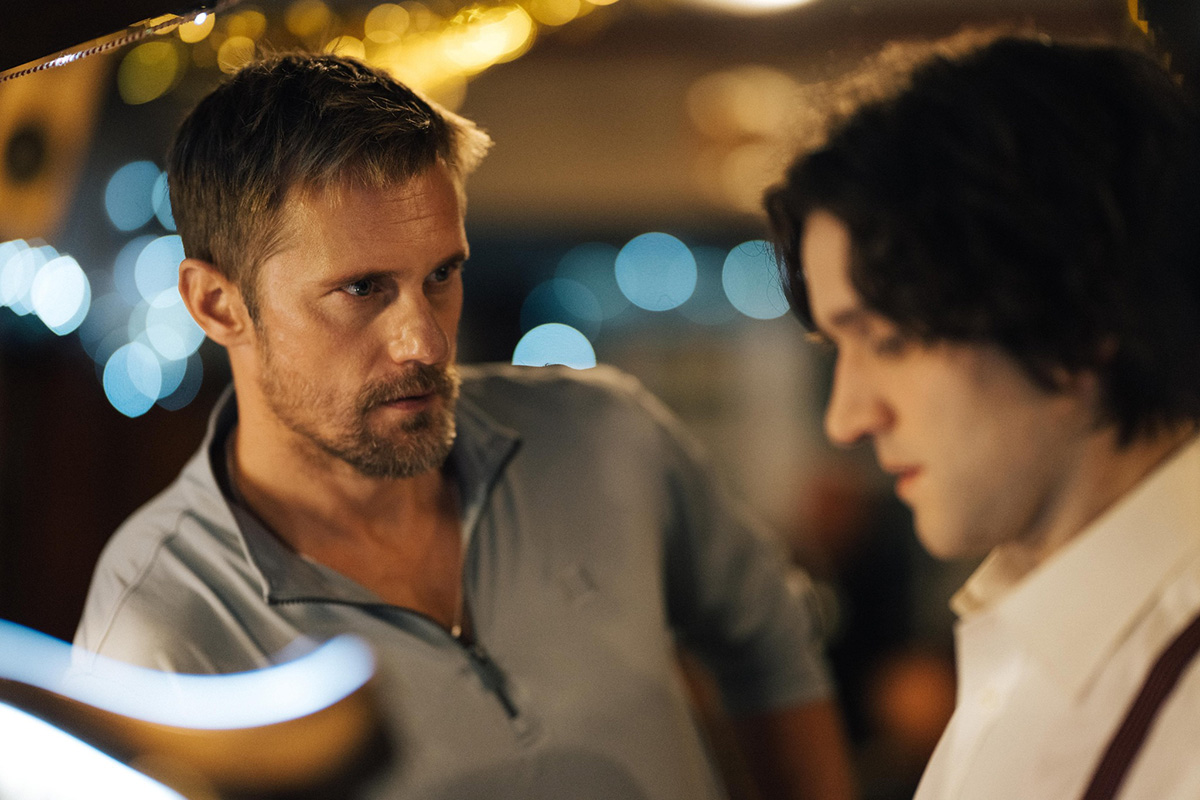
One of the highlights of last week’s Mid-Atlantic Leather Weekend came not on the dance floor, but in a movie theater. In a new partnership, the independent film studio A24 brought its leather-clad new film “Pillion” to D.C. for special showings for the MAL crowd.
“Pillion,” a term for the motorcycle passenger seated behind the driver, delves into the complicated relationship between an introverted, quiet Londoner Colin (Harry Melling) who embarks on a journey finding himself while entering into a sub relationship with a new Dom named Ray (Alexander Skarsgård) he meets during Christmas.
It’s writer-director Harry Lighton’s feature-length debut, sharing Skarsgård’s impossibly toned physique with both Colin and audiences, and offering an eye into the BDSM community by an LGBTQ director for the general public. This from a studio that also just released a movie about ping-pong starring Timothée Chalamet.
The Washington Blade was able to catch a screening at Regal Gallery Place on Jan. 18, hosted by MAL and Gary Wasdin, executive director, Leather Archives & Museum. The Blade also had a chance to interview Lighton about the experience.
Blade: How did you get involved in this film, especially as this is your directorial debut?
Lighton: I was sent “Box Hill,” the novel on which “Pillion” is based, by Eva Yates (the head of film at the BBC). I’d spent years working on a sumo film set in Japan, and then suddenly that became impossible due to the pandemic so I was miserable. And then I read this book that I found bracing, funny, moving. All the good things.
Blade: Are you involved with the leather community? Did you draw on any personal experiences or make connections with the community?
Lighton: I’m involved in the wrestling scene but not the leather community. So I spent lots of time with people who are [in the community] during the writing process, and then ended up casting a bunch of them as bikers and pillions in the film. They were incredibly generous to myself, Harry, and Alex with their knowledge and experiences. We have them to thank for lending credibility to the world on screen.
Blade: What kind of reception have you received at film festivals and with the LGBTQ community? Was it what you imagined?
Lighton: Obviously not everyone’s going to like the film — for some people it’ll be too explicit, for some not explicit enough; some people will feel seen, some won’t. But the general reaction’s been extremely positive so far. If I’m honest I thought it would divide opinion more.
Blade: How was it working with the actors?
Lighton: I had a lot of respect for both of them going in, and wondered if that might make me a bit too deferential, a bit too Colin-coded. But besides being extremely talented, they’re both lovely. And committed. And fun! With my shorts I always felt a bit out of my depth working with actors, but here I discovered a real love for it.
Blade: Turning to the plot, the parents are pretty supportive, especially Colin’s dad. How did you decide to draw his parents? What does it mean to show parents with nuanced viewpoints?
Lighton: I wanted to reverse the typical parent-child dynamic in queer film, where parents go from rejecting to accepting their queer kid. We meet Colin’s parents actively pushing him toward a gay relationship. But when the relationship he lands on doesn’t meet her definition of healthy, his mum withdraws her acceptance. I wanted to ask: Are they projecting their romantic model onto their son, or do they have a legitimate concern for his wellbeing with Ray?
Blade: How did you decide to place the setting?
Lighton: Practically, we needed somewhere within reach of London. But I liked the idea that Colin, who lives life on the periphery, grew up on the edge of the capital. One of our producers, Lee Groombridge, grew up in and around Bromley and showed me all the spots. I loved the atmosphere on the high street, the markets, and the contrast between the high street and the idyllic park. And I thought it would be a funny place for Alexander Skarsgård to have settled.
Blade: What do you hope audiences take away from the film?
Lighton: There’s no one message. Different people will take different things from it. Personally, Colin inspires me to jump off cliffs, to push beyond my comfort zone because that’s where life begins. From Ray I get the courage to be ugly, to fly in the face of social convention if it doesn’t make you happy or it’s not built for you.
Blade: Talk about the soundtrack — especially the Tiffany “I Think We’re Alone Now” song.
Lighton: Skarsgård’s Ray has the surface masc-ness that comes with looking like a Viking. I wanted to combine that with details that indicate he’s been a part of gay culture and “I Think We’re Alone Now” is nothing if not a camp classic.
Blade: What does it mean to you to show the film at MAL?
Lighton: When I told the bikers from the film I was coming to MAL they practically wet themselves with excitement. We put a lot of thought and effort into how we depicted the community in the film and there’s so much variety, no two Masters or subs are the same, but seeing a theater full of men in leather laugh, cry, and clap for the film meant the world.

